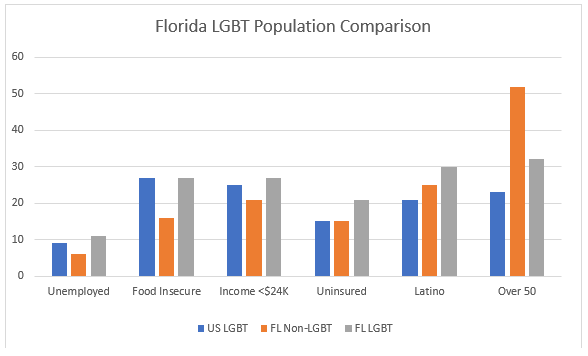
The LGBT population encompasses a highly diverse group of individuals that present unique healthcare challenges and barriers. Florida’s distinct demographics add further complexity to these challenges. This brief summarizes LGBT healthcare issues, highlights those challenges unique to Florida, and finally, suggests how expansion of Medicaid in Florida will benefit LGBT individuals in the state.
LGBT Health Concerns
The LGBT population as a whole experiences poorer health than its heterosexual counterpart. LGBT individuals exhibit higher prevalence, as well as earlier onset, of general disability. Studies show that the population experiences elevated rates of asthma, allergies, osteoarthritis, and gastrointestinal problems. The LGBT population also experiences higher risks of cardiovascular disease and some cancers.1 Additionally, gay and bisexual men continue to account for the highest rates of HIV and new HIV infection in the U.S. as well as other sexually transmitted infections.2, 3 Transgender women also face a higher prevalence of HIV.4 Lastly, LGBT persons experience higher rates of mental health conditions and substance abuse.1, 5 These statistics warrant particular attention to LGBT healthcare access.
Florida’s LGBT Population
LGBT individuals in Florida experience higher rates of unemployment, food insecurity, and low-income status than both their national LGBT counterparts and non-LGBT persons in the state. Similarly, lack of health insurance affects Florida LGBT persons at a higher rate. Furthermore, data show that Florida’s LGBT population includes a higher percentage of individuals over the age of 50 compared to national numbers (32% v. 23%). Florida’s LGBT population also consists of a higher percentage of Latino persons (30% v. 21%).6 These factors create a complex array of challenges affecting Florida’s LGBT population.

Sources: Bureau, U.S. Census. (2017). American Fact Finder. Retrieved from Factfinder.census.gov. 6 June 2019.
LGBT Demographic Data Interactive. (January 2019). Los Angeles, CA: The Williams Institute, UCLA School of Law. Retrieved from https://williamsinstitute.law.ucla.edu/lgbtstats/. 6 June 2019.
Impact of Florida Medicaid Expansion
Nationally, Medicaid expansion resulted in an estimated 511,000 additional LGB* individuals being covered thus far in those states opting to expand coverage.7 The Kaiser Family Foundation estimates that 837,000 total Florida residents may benefit from Medicaid expansion in the state. That total ranks second only to Texas of the fourteen states that have not expanded.8 The exact number of LGBT individuals included in Florida’s total remains unknown. However, with an estimated LGBT proportion of 4.6% in Florida, extrapolation yields that approximately 38,500 LGBT individuals might benefit from expansion. This significant number highlights the importance of Medicaid expansion to healthcare for Florida’s LGBT population.
*Transgender individuals not included.
1. Lick, D., Durso, L.E., & Johnson, K.L. (2013). Minority Stress and Physical Health Among Sexual Minorities. Pers on Psychological Sci 8(5): 521-548
2. Centers for Disease Control and Prevention, U.S. Department of Health and Human Services. (2019). HIV Among Gay and Bisexual Men. Retrieved from https://www.cdc.gov/nchhstp/newsroom/docs/factsheets/cdc-msm-508.pdf. 6 June 2019.
3. Centers for Disease Control and Prevention, U.S. Department of Health and Human Services. (2016). Gay and Bisexual Men’s Health: Sexually Transmitted Diseases. Retrieved from https://www.cdc.gov/msmhealth/STD.htm. 6 June 2019.
4. Baral SD, et al. (2013). Worldwide burden of HIV in transgender women: a systematic review and meta-analysis. The Lancet Infectious Disease. 13(3): 214–222.
5. Cochran, S.D., Sullivan, J.G. & Mays, V.M. (2003). Prevalence of mental disorders, psychological distress, and mental health services use among Lesbian, Gay, and Bisexual adults in the United States. Journal of Consulting and Clinical Psychology71(1): 53-61.
6. LGBT Demographic Data Interactive. (2019). Los Angeles, CA: The Williams Institute, UCLA School of Law. Retrieved from https://williamsinstitute.law.ucla.edu/lgbtstats/. 6 June 2019.
7. L. Dawson, J. Kates, and A. Damico. (2018). Kaiser Family Foundation. The Affordable Care Act and Insurance Coverage Changes by Sexual Orientation. Retrieved from https://www.kff.org/disparities-policy/issue-brief/the-affordable-care-act-and-insurance-coverage-changes-by-sexual-orientation/. 12 June 2019.
8. Garfield, Rachel, Kendal Orgera, and Anthony Damico. (2019). The Coverage Gap: Uninsured Poor Adults in States That Do Not Expand Medicaid. Issue brief. Washington, D.C.: Kaiser Family Foundation. Retrieved from https://www.kff.org/medicaid/issue-brief/the-coverage-gap-uninsured-poor-adults-in-states-that-do-not-expand-medicaid/. 13 June 2019.
